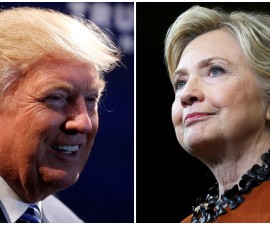(单词翻译:单击)
JUDY WOODRUFF: Right now, though, we want to step back and get some historical perspective on this Election Day.
And joining us is "NewsHour" regular Michael Beschloss.
It's so good to have you back with us again, Michael.
MICHAEL BESCHLOSS, Presidential Historian: Thank you so much, Judy.
JUDY WOODRUFF: Well, there is so much to think about on this Election Day, after what the country has been through.
Is there any election, Michael, you can compare this to?
MICHAEL BESCHLOSS: No.
MICHAEL BESCHLOSS: And I spend my whole life looking for parallels, and usually I can find at least a contrived one.
But you cannot think of a campaign that's been this personal and this negative. And debates — these have been the nastiest debates. And the difference is, you know, oftentimes, people will say, well, didn't John Adams and Thomas Jefferson dis each other?
Yes, they did, but they usually didn't do it personally, and they sure didn't do it on TV.
HARI SREENIVASAN: What about the divisiveness of the country? That seems to have translated directly from the campaigns on to how vitriolic people are against the other candidate? Has that happened before?
MICHAEL BESCHLOSS: Oh, I think — not to this disagree.
And if we were living in a perfect world, if this were the election in American history where there were the biggest policy differences, you might expect this, 1860, when we were about on the verge of the Civil War over slavery, or 1940, when we were fighting over whether we should get involved in a war against Adolf Hitler.
There are huge issue differences this year, but nothing like that.
JUDY WOODRUFF: I have been dying to ask you this question for a long time. What would the founding fathers think about the idea either of electing a woman as president or electing someone to office who had no experience in elective politics?
MICHAEL BESCHLOSS: Well, the lack of experience, actually, they would find a little bit more understandable, because they wanted people who were not lifetime politicians. They wanted Cincinnatus to go back to his plow.
They wouldn't have imagined the idea of a woman as president. But I think, if they had thought a little harder, they would have had to think what the freedoms and the values and the goals of the Constitution that they wrote were likely — it might take two centuries, as it did, but were likely to lead to a female president at some point.

HARI SREENIVASAN: What about the historic nature of that? Hillary Clinton is closer than anybody ever has been to the office as a woman. I mean, she ran unsuccessfully in another term, but how historic is it?
MICHAEL BESCHLOSS: The miracle is that it took this long.
The 19th Amendment, which denied states the ability to deny women the vote, that was 1920. So, that was 96 years ago. And if you go back, as I have, to the debates of 1920, they were saying, just give women the vote, there will be a lot of female office holders, there will probably be a woman president with a couple decades. Didn't happen.
We have to ask why it took so long.
HARI SREENIVASAN: And we're not anywhere close to parity even in terms of representation in Congress today.
MICHAEL BESCHLOSS: Absolutely, absolutely.
JUDY WOODRUFF: So, Michael, as you think about — again, about the division in the country and about the need to heal this country, what does the historian in you — how do you see that?
Do you look at something, oh, yes, we have been through tough times before, we will get through this, or do you look at this as really a moment that's unlike any other in terms of how divided we are?
MICHAEL BESCHLOSS: Well, I think the happy thing is that the ugliness is more personal and more based on the kind of campaign we have been through than because we're dealing with an issue like Hitler or the Civil War.
If you have got a president-elect coming in and saying, one of my first responsibilities, if not the supreme one, will be to heal and unite this nation, that can do a lot. That's happened in history.
JUDY WOODRUFF: So, keeping out immigrants, changing trade policy doesn't rise to the level of a dispute over slavery?
MICHAEL BESCHLOSS: It is deep and it is rancorous, but it's not to that level.
JUDY WOODRUFF: Michael Beschloss, it's great to have you with us. And we will be talking to you through the evening.
MICHAEL BESCHLOSS: Thank you. Looking forward.
HARI SREENIVASAN: Thank you, Michael.


